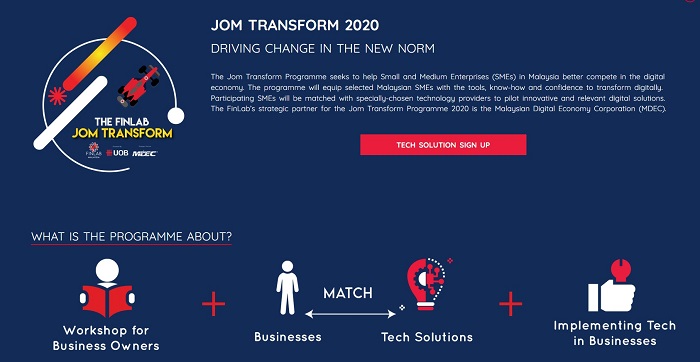UOB’s FinLab goes Online, helps SMEs prioritise for digitalisation
By Kiran Kaur Sidhu January 14, 2021
- SMEs most keen on Digital Marketing, E-commerce, and Business Operations
- Assessment gives CEOs better understanding of needs and prioritise for growth

“The SME community is very hungry to transform their business digitally. We are witnessing the new digitally-savvy generations coming onboard. But of course, Covid-19 also intensified and accelerated digital adoption,” says Yap Kok Tee, the executive director and country head of Channels and Digitalisation, United Overseas Bank (UOB) Malaysia.
Yap (pic, right) was speaking at a briefing on The FinLab, a regional innovation accelerator by UOB Bank aimed not at startups but more for small and medium enterprises (SMEs), to assist businesses on their digitalisation journey through business transformation. As a Singapore bank, the FinLab programme  was first launched in 2015 in Singapore and expanded to Thailand and Malaysia in 2019. The Malaysia Digital Economy Corporation (MDEC) is a strategic partner for the programme to provide advisory in digitalisation.
was first launched in 2015 in Singapore and expanded to Thailand and Malaysia in 2019. The Malaysia Digital Economy Corporation (MDEC) is a strategic partner for the programme to provide advisory in digitalisation.
Addressing variances in needs of SMEs and cultural differences in these markets, the programme is branded differently as well – in Singapore it is called FinLab Propel Programme, in Malaysia Jom Transform Programme, and in Thailand as the Smart Business Transformation Programme.
While areas of priority may differ by country, the head of FinLab, Pauline Sim (pic, left), points out more commonalities between the countries. “During this time [2020], SMEs are open to seeing how they can survive and thrive in their own countries. We also see SMEs looking to leverage on the FinLab Regional to expand and grow their business overseas.”
Speaking specifically about the Malaysian programme, in 2019, the Jom Transform Programme provided support to 16 SME participants. At the end of the programme, SMEs were also aided in their application for the Smart Automation Grant (SAG) by Malaysia Digital Economy Corporation (MDEC). As expected, the programme went online last year and this allowed it to enjoy greater reach with 700 participants nationwide.
Of this, 270 went on to participate in the Jom Transform Programme which included masterclasses and learning through videos, infographics and articles.
The participating SMEs cut across business segments. “The 88 SMEs in cohort 1 for last year’s programme come from various backgrounds, from the wholesale and retail trade, services, and F&B industry. As for cohort 2, SMEs largely came from the wholesale and retail trade, services, and logistics industry,” shared Pauline.
A structured programme awaits participants with a Digital Needs Assessment (DNA) Test in Week 1 to enable business owners to have a better understanding on their business needs and prioritise which digitalisation area to focus on. Based on the outcome of the test, SMEs are suggested which workshop tracks to participate in during Week 2 and 3.
“Fundamentally, we want to equip SMEs with the right tools, know-how and confidence to transform digitally. One of the key factors of a successful digital transformation, lies in the mindset of the people within your organisation. We are looking for business owners who are open-minded, willing to learn and explore opportunities available and ready to adapt to new changes,” says Yap.
Although there are three main tracks, namely Digital Marketing, E-commerce, and Business Operations, the areas of transformation are not limited to these areas only. “In fact, in the series of workshops offered through Jom Transform Programme, we also covered topics such as robotic automation process (RPA), banking and financial needs sharing and more,” explains Yap.
Of the workshops offered, the most popular, unsurprisingly, were the Digital Marketing workshops, followed by Business Operation workshops, and E-commerce workshops. “Last year, through the DNA exercise for cohorts 1 and 2, 45% of participants indicated digital marketing as an area of focus, while 33% and 32% cited e-commerce and business operations,” says Pauline.
In Week 4, participants attend a tech pitching session, where curated tech solution providers will pitch and showcase their products or solutions where participants will then pick a suitable solution for their company. There are 21 third-party tech solution providers registered with The FinLab Online for the Malaysian market.
Pauline shares the example of an e-commerce solution by Singapore listed Synagie Corp that enables SMEs to go cross border. “There are businesses that leverage on the FinLab regional network to see how they can expand and grow their business. Synagie helps businesses that don’t really want to set up shop and invest in a new market but are perhaps keen to enter through e-commerce.” From there, SMEs can gauge product take and learn from customer responses to their product.
As a regional bank, Pauline points out that UOB’s foreign direct investment team can significantly help SMEs plant their presence in other ASEAN markets. “In the past, without this focus on borderless and digital [solutions], SMEs would probably look at finding distributors and setting up office. But now, going digital is a very viable avenue for SMEs to introduce their products and our Finlab Programme helps them get ready.”
Related Stories :


